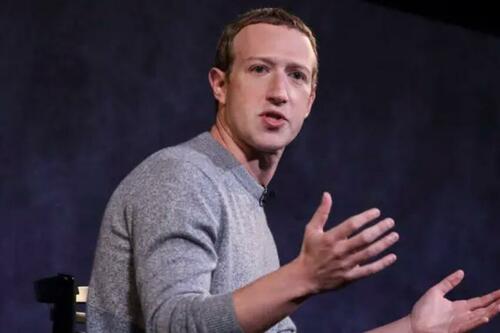
Authored by Benjamin Kew via The Epoch Times,
Meta CEO Mark Zuckerberg’s microblogging platform Threads, launched to great acclaim as Instagram’s “Twitter Killer” in July, appears to be showing signs of struggle.
The initial signs for Threads were extremely encouraging.
The platform—nearly a carbon copy of Twitter, now known as X—pulled in a staggering 100 million sign-ups in less than five days.
Forbes senior contributor John Koetsier outlined how Twitter had “imploded” under the leadership of Elon Musk and cited the “instant credibility” and “simplicity” of Threads as an alternative.
Yet nearly two months on from its seemingly successful launch, Zuckerberg’s vision of stealing Twitter’s thunder may be little more than a pipe dream.
Even NBC admitted on Aug. 24 that the platform is “struggling for traction.”
"An analysis of Android users by Similarweb, a digital data and analytics company, estimated that daily active users on Threads’ Android app peaked at 49.3 million in early July and fell to 10.3 million after a month—a drop of nearly 80%,” the media outlet reported in mid-August.
A week after its July 5 launch, daily active Threads users peaked at around 26.7 million, then gradually declined to around 13.5 million by month’s end, it said.
“Some celebrities who joined the platform before it was available to the public, such as Jennifer Lopez and Tom Brady, haven’t posted at all since launch week. MrBeast, the YouTube star who was the first user to reach 1 million followers on Threads, stopped posting about a month ago.”
One of the most common theories among conservatives for the platform's underwhelming start is that while Twitter has finally embraced free speech, Threads is a platform governed by strict content moderation and politically driven censorship.
Allum Bokhari, a senior technology reporter at Breitbart News and author of "Deleted: Big Tech's Battle to Erase a Movement and Subvert Democracy," told The Epoch Times that the weakness of Threads lies in its failure to attract subversive content.
"Threads was touted as the polite, politically correct alternative to Elon Musk's X. But when the selling point of your platform is inoffensiveness, you can't be surprised when users simply get bored,” Mr. Bokhari explained.
“X has become friendlier to edgy, dissident content that polite society would prefer to see banned, and that's precisely why its users remain loyal.”
This photo illustration shows the X logo (formerly Twitter) on a smartphone screen in Los Angeles, California, on July 31, 2023. (Chris Delmas/AFP via Getty Images)
Free Speech Is Not the Only Concern
Yet, issues of free speech are far from the only concern.
Jake Denton, a research associate at the Tech Policy Center for The Heritage Foundation, told The Epoch Times that while X is moving forward with offering new features, Threads still provides a disappointing user experience.
“While Zuckerberg and Meta were quick to boast about the early sign-up numbers for Threads, that momentum has rapidly dissipated, and the platform seems to be in free fall," he said.
“What strikes me most is the stark contrast between the early promises of an exciting new platform and the underwhelming reality that one finds upon logging in.”
Users eager for a fresh experience encountered “a feed saturated with interactions between mega-corporations and consumer brands as” Mr. Denton said, comparing it to “stumbling into a virtual networking event for their social media managers.”
“Meta will truly need a miracle to save this platform from irrelevancy. If Zuckerberg can’t find a way to bring interesting content to the platform—content that people actually want to consume—Threads will be dead on arrival,” he predicted.
Not everyone is as pessimistic about the company’s future.
Mike Benz, executive director of the Foundation for Freedom Online, warned that Threads could be waiting for X to experience a crisis that it can take advantage of.
“Threads doesn’t need to be as good as Twitter to dethrone it—all it needs to be is a close-enough substitute … [so] that when Twitter is destabilized and put into crisis, Threads can be there to catch the fall,” he told The Epoch Times.
“That crisis can come from several directions: financial, if advertiser boycotts ramp back up; legal, via bankrupting lawfare; and regulatory, via new regulations such as the EU’s new disinformation laws.
“There are 2.3 billion Instagram users, versus only 450 million Twitter users. That’s a 5x size advantage Threads has to tap into in terms of the Facebook-Instagram-WhatsApp economy into which Threads is being installed. You can’t underestimate that or rule it out. Especially with government and institutional support,” Mr. Benz said.
He added that, given Mr. Zuckerberg’s willingness to comply with the demands of the Biden administration, Threads may also benefit from being the app of choice for the U.S. national security state.
“Zuckerberg has won back much of that support after doing the Biden admin’s bidding on all things content moderation ahead of the 2020 election and throughout this term,” Mr. Benz said.
“Because Zuckerberg has proven to be such a reliable ally to the Pentagon and State Department, I would not be surprised if Threads begins to be pushed by the U.S. government for dissident groups funded by the U.S. national security state to use while organizing revolutions or resistance movements abroad,” he said, likening it to the State Department promoting Telegram in 2020 for the attempted color revolution in Belarus.
“It’s hard to predict at the moment,” Mr. Benz said. “… as the 2024 election approaches, or another pandemic scare, or some other crisis or high-stakes geopolitical event appears, the true nature of the threat posed by Threads will make itself more clear.”
However, others believe that Threads’ commitment to censoring the political fringes will prove fatal to its long-term survival.
Among them is former Harvard professor Robert Epstein, a senior research psychologist at the American Institute for Behavioral Research and Technology, who argued that Zuckerberg’s best hope is that Elon Musk sabotages his own company.
“I don't see a way for Threads to overtake Twitter/X in the microblogging domain,” said Mr. Epstein.
“By minimizing moderation—which Facebook can't do on Threads—Twitter is attracting more extreme content than it ever has before, and extreme content draws traffic. I don't see a way for Facebook to compete with that.”
"Of course, it is always possible that Musk or his appointees will mismanage "X" so badly that the company just implodes,” he continued. “Perhaps Zuckerberg is counting on that.”
Yet given Mr. Musk’s track record of building successful companies, most notably Tesla and SpaceX, some might argue that this possibility remains remote.
Mr. Zuckerberg, meanwhile, remains publicly optimistic, insisting that he will spend the rest of the year developing its product and fighting to retain its users.
“I'm very optimistic about how the Threads community is coming together. Early growth was off the charts, but more importantly, 10s of millions of people now come back daily … way ahead of what we expected,” he wrote in late July.
"The focus for the rest of the year is improving the basics and retention. It'll take time to stabilize, but once we nail that then we'll focus on growing the community. We've run this playbook many times (FB, IG, Stories, Reels, etc) and I'm confident Threads is on a good path too.”
Authored by Benjamin Kew via The Epoch Times,
Meta CEO Mark Zuckerberg’s microblogging platform Threads, launched to great acclaim as Instagram’s “Twitter Killer” in July, appears to be showing signs of struggle.
The initial signs for Threads were extremely encouraging.
The platform—nearly a carbon copy of Twitter, now known as X—pulled in a staggering 100 million sign-ups in less than five days.
Forbes senior contributor John Koetsier outlined how Twitter had “imploded” under the leadership of Elon Musk and cited the “instant credibility” and “simplicity” of Threads as an alternative.
Yet nearly two months on from its seemingly successful launch, Zuckerberg’s vision of stealing Twitter’s thunder may be little more than a pipe dream.
Even NBC admitted on Aug. 24 that the platform is “struggling for traction.”
“An analysis of Android users by Similarweb, a digital data and analytics company, estimated that daily active users on Threads’ Android app peaked at 49.3 million in early July and fell to 10.3 million after a month—a drop of nearly 80%,” the media outlet reported in mid-August.
A week after its July 5 launch, daily active Threads users peaked at around 26.7 million, then gradually declined to around 13.5 million by month’s end, it said.
“Some celebrities who joined the platform before it was available to the public, such as Jennifer Lopez and Tom Brady, haven’t posted at all since launch week. MrBeast, the YouTube star who was the first user to reach 1 million followers on Threads, stopped posting about a month ago.”
One of the most common theories among conservatives for the platform’s underwhelming start is that while Twitter has finally embraced free speech, Threads is a platform governed by strict content moderation and politically driven censorship.
Allum Bokhari, a senior technology reporter at Breitbart News and author of “Deleted: Big Tech’s Battle to Erase a Movement and Subvert Democracy,” told The Epoch Times that the weakness of Threads lies in its failure to attract subversive content.
“Threads was touted as the polite, politically correct alternative to Elon Musk’s X. But when the selling point of your platform is inoffensiveness, you can’t be surprised when users simply get bored,” Mr. Bokhari explained.
“X has become friendlier to edgy, dissident content that polite society would prefer to see banned, and that’s precisely why its users remain loyal.”
This photo illustration shows the X logo (formerly Twitter) on a smartphone screen in Los Angeles, California, on July 31, 2023. (Chris Delmas/AFP via Getty Images)
Free Speech Is Not the Only Concern
Yet, issues of free speech are far from the only concern.
Jake Denton, a research associate at the Tech Policy Center for The Heritage Foundation, told The Epoch Times that while X is moving forward with offering new features, Threads still provides a disappointing user experience.
“While Zuckerberg and Meta were quick to boast about the early sign-up numbers for Threads, that momentum has rapidly dissipated, and the platform seems to be in free fall,” he said.
“What strikes me most is the stark contrast between the early promises of an exciting new platform and the underwhelming reality that one finds upon logging in.”
Users eager for a fresh experience encountered “a feed saturated with interactions between mega-corporations and consumer brands as” Mr. Denton said, comparing it to “stumbling into a virtual networking event for their social media managers.”
“Meta will truly need a miracle to save this platform from irrelevancy. If Zuckerberg can’t find a way to bring interesting content to the platform—content that people actually want to consume—Threads will be dead on arrival,” he predicted.
Not everyone is as pessimistic about the company’s future.
Mike Benz, executive director of the Foundation for Freedom Online, warned that Threads could be waiting for X to experience a crisis that it can take advantage of.
“Threads doesn’t need to be as good as Twitter to dethrone it—all it needs to be is a close-enough substitute … [so] that when Twitter is destabilized and put into crisis, Threads can be there to catch the fall,” he told The Epoch Times.
“That crisis can come from several directions: financial, if advertiser boycotts ramp back up; legal, via bankrupting lawfare; and regulatory, via new regulations such as the EU’s new disinformation laws.
“There are 2.3 billion Instagram users, versus only 450 million Twitter users. That’s a 5x size advantage Threads has to tap into in terms of the Facebook-Instagram-WhatsApp economy into which Threads is being installed. You can’t underestimate that or rule it out. Especially with government and institutional support,” Mr. Benz said.
He added that, given Mr. Zuckerberg’s willingness to comply with the demands of the Biden administration, Threads may also benefit from being the app of choice for the U.S. national security state.
“Zuckerberg has won back much of that support after doing the Biden admin’s bidding on all things content moderation ahead of the 2020 election and throughout this term,” Mr. Benz said.
“Because Zuckerberg has proven to be such a reliable ally to the Pentagon and State Department, I would not be surprised if Threads begins to be pushed by the U.S. government for dissident groups funded by the U.S. national security state to use while organizing revolutions or resistance movements abroad,” he said, likening it to the State Department promoting Telegram in 2020 for the attempted color revolution in Belarus.
“It’s hard to predict at the moment,” Mr. Benz said. “… as the 2024 election approaches, or another pandemic scare, or some other crisis or high-stakes geopolitical event appears, the true nature of the threat posed by Threads will make itself more clear.”
However, others believe that Threads’ commitment to censoring the political fringes will prove fatal to its long-term survival.
Among them is former Harvard professor Robert Epstein, a senior research psychologist at the American Institute for Behavioral Research and Technology, who argued that Zuckerberg’s best hope is that Elon Musk sabotages his own company.
“I don’t see a way for Threads to overtake Twitter/X in the microblogging domain,” said Mr. Epstein.
“By minimizing moderation—which Facebook can’t do on Threads—Twitter is attracting more extreme content than it ever has before, and extreme content draws traffic. I don’t see a way for Facebook to compete with that.”
“Of course, it is always possible that Musk or his appointees will mismanage “X” so badly that the company just implodes,” he continued. “Perhaps Zuckerberg is counting on that.”
Yet given Mr. Musk’s track record of building successful companies, most notably Tesla and SpaceX, some might argue that this possibility remains remote.
Mr. Zuckerberg, meanwhile, remains publicly optimistic, insisting that he will spend the rest of the year developing its product and fighting to retain its users.
“I’m very optimistic about how the Threads community is coming together. Early growth was off the charts, but more importantly, 10s of millions of people now come back daily … way ahead of what we expected,” he wrote in late July.
“The focus for the rest of the year is improving the basics and retention. It’ll take time to stabilize, but once we nail that then we’ll focus on growing the community. We’ve run this playbook many times (FB, IG, Stories, Reels, etc) and I’m confident Threads is on a good path too.”
Loading…






